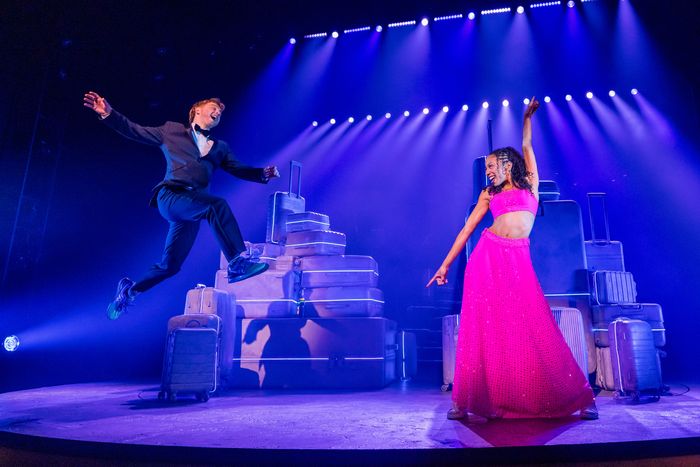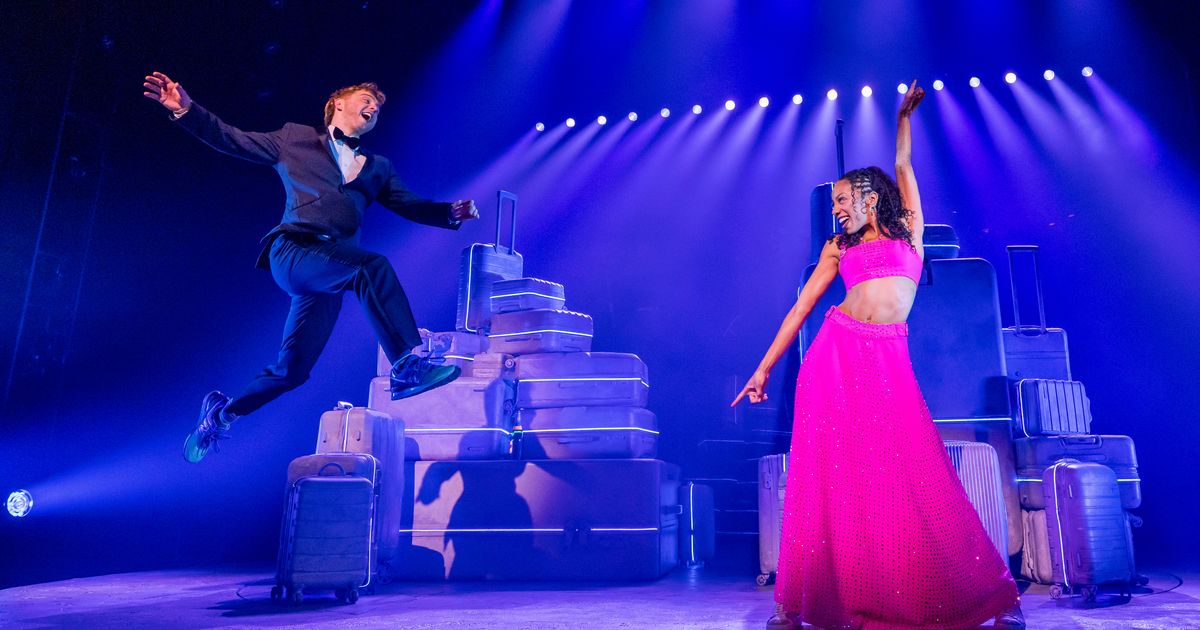
Sam Tutty and Christiani Pitts in Two Strangers (Carry a Cake Across New York).
Photo: Matthew Murphy
A good survey of the attenuated state of stage musicals these days might start by noting that there are only two new ones on Broadway this fall, and that, in subject and presentation, they lie at opposite ends of a vast socioeconomic divide. To get anywhere in this town lately, one must be either too large or too small to fail. Over at the St. James Theatre, The Queen of Versailles, a luxe spectacle with a giant staircase to prove it, finds its justification and cash flow through its deployment of star, Kristin Chenoweth. (Never mind that its addiction to gilt is part of why it isn’t any good.) A few blocks uptown at the Longacre, you’ll find the anonymous characters of Two Strangers (Carry a Cake Across New York), who are making do with incomes far beneath the Versailles level—one has arrived in the city for a wedding with about $60 in cash—in a show whose tiny scale clearly reduced the financial risk of producing it. The stars Sam Tutty and Christiani Pitts are both charming musical theater actors, but neither is well-known, and your Playbill will remind you that this is the first musical by its British creators, Jim Barne and Kit Buchan. There’s a little fan momentum behind the show—Two Strangers premiered in London before doing a tryout in Boston—but it’s no Harry Potter. The show plays out on a single rotating set, designed by Soutra Gilmour, amid a collection of what appears to be abandoned luggage at a baggage claim that stands in for a variety of New York City locales.
Smallness, mind you, can be a great thing in a musical. With sharp enough eyes and ears, creative teams can unveil a richness of texture in confined emotional and visual terrain—the exquisite carved miniature of The Band’s Visit, which Buchan and Barne have cited as inspiration for Two Strangers, being a prime example. Two Strangers does so by looking closely at the lives of a pair of relatively ordinary people: A British man, Dougal (played by Tutty), has come to town for his father’s wedding to the sister of an American named Robin (played by Pitts). Dougal and Robin are bound by circumstance but opposite in nature—he’s a wide-eyed optimist who wants to see every landmark, she’s a hardened New Yorker who’s over it all—and they bicker their way across the city running an errand while growing closer. The day before the ceremony, Robin’s sister demands that she pick up the wedding cake from a bakery in Brooklyn; Dougal, who’s being pointedly ignored by his father, is happy to glom onto her cross-borough adventure. Barne and Buchan’s premise pulls on shades of Before Sunrise, with more than a little of the corniness of a Hallmark Christmas movie, but they wisely resist a too-neat conclusion. We never see any other character onstage—and only briefly hear the voices of some—but the sense that there are people who are always “more important” than our protagonists lingers over the story nicely, whether those are the family members involved in the wedding or simply other New Yorkers who have the family money or successful careers that give them access to the metal-plated credit cards Dougal and Robin wish they could use to swipe their way through the city with ease.
If you could praise a musical based on its pitch alone, Two Strangers would have it all bound up. In execution, however, this cake isn’t fully baked. Barne and Buchan’s contemporary-pop score lacks distinctiveness, and it treads closely in the footsteps of other musical theater—there’s more than one ballad that you could convince me was a draft that Pasek and Paul discarded. Whereas a close attention to character makes for good storytelling, it’s an exacting standard to live up to in writing. Early in act one, Barne and Buchan have Dougal sailing along the train from JFK to Manhattan singing an ode to “New York” that’s meant to be intentionally naïve—he imagines “pizza for breakfast”—but it crosses the line into sloppy when, in the chorus, they search for a rhyme and have Dougal announce that in New York, he’s “already popping the cork.” (A trite image made worse by the fact that Charley Kringas, in Stephen Sondheim’s Merrily We Roll Along, proposes the same rhyme, then mutters, “I’ll fix that line.”) Rough phrasing can be powered through on an ATV of anthemic feeling—thus the career of Tim Rice—but Barne and Buchan are aiming to find depth in the small, and every lyrical imprecision destabilizes the whole.
The two are generally more comfortable writing for Dougal, a grating and overenthusiastic rosy-cheeked British bloke whom Tutty brings to life with Energizer levels of mama’s boy energy. A woman sitting near me asked her friend if she could “steal him for myself,” which is both unsettling and captures the spell Tutty casts over an audience. But the British-and-male creative team gets lost writing for Robin, a Black woman from Flatbush. While it makes sense for Dougal to sing New York clichés, you’d hope she’d have something more specific to say about her neighborhood than that it’s where you can get “ten-dollar shoes, fake nails, a broken record player, Cuban quesadillas, and weed,” or “where you can come and watch the city on Saturday nights.” (I asked my colleagues at Grub Street and no one could explain what a Cuban quesadilla is, and isn’t Flatbush too low-lying to see the Manhattan skyline?) She also tells us that she likes to go to the Brooklyn Public Library. (If she means the central branch, that’s on the other side of the park.) I’m picking nits, sure, but a two-hander lives and dies on its focus. Pitts brings an intriguing sense of frustrated ambition and disappointment to Robin in her performance, and that enriches the character, but there’s only so much she can find in the text. She’s trying to look through a microscope while someone knocks it around with oven mitts.
The venue itself may be in part to blame here. In a smaller theater, without the pressure to live up to the standard of a Big Broadway Musical, Two Strangers would most likely look like an exciting work from promising new writers. For its staging at the Longacre, with an unnecessary intermission that slams the brakes on the action, the director Tim Jackson has slathered the thing in the icing of sentiment and popped his cork (I’ll fix that later) trying to make a small story feel bigger. Gilmour’s set, that pile of versatile luggage, has the right idea of allowing us in the audience to imagine the magical city the show’s characters keep describing without ruining it with the literalism of giant 30 Rockefeller Plaza setpieces or, worse, a huge screen. But there’s a visible and anxious need to layer crowdpleasing gestures on top of that simplicity: Near the end of the musical, a deluge of fake snow falls over a scene, overegging the intended romantic melancholy. Trust in your performers! Let the audience come to them.
When Two Strangers does do that, it does achieve something magical, and those moments make you see what a smaller-scale musical can do successfully without a huge budget or soapy showmanship. In the show’s more reflective second act, we get more detail about Dougal and Robins’s backstories, and Barne and Buchan do their best work. “He Doesn’t Exist,” a number sung by Robin—Pitts attacks it with a just-right heartbreak—is about the shared pain of an absent father, with fairy-tale imagery that syncs with the way a child is taught to fantasize, undercut by the adult realization indicated by the song’s title. As you grow, you do the hard work of parting with the vision of the world you had in your head. That’s a dynamic repeated throughout Two Strangers. Dougal is learning to give up both his idealized image of a foreign city and the relationship with his father he thinks he could re-ignite during this trip, and Robin learns to abandon the myth she’s telling herself about her own failure. When the show’s creators zero in on those feelings, something a lot more specific and wistful than a love story between two strangers, the piece comes alive. If only it stayed there.
Two Strangers (Carry a Cake Across New York) is at the Longacre Theatre.
Sign up for The Critics
A weekly dispatch on the cultural discourse, for subscribers only.
Vox Media, LLC Terms and Privacy Notice
Related

